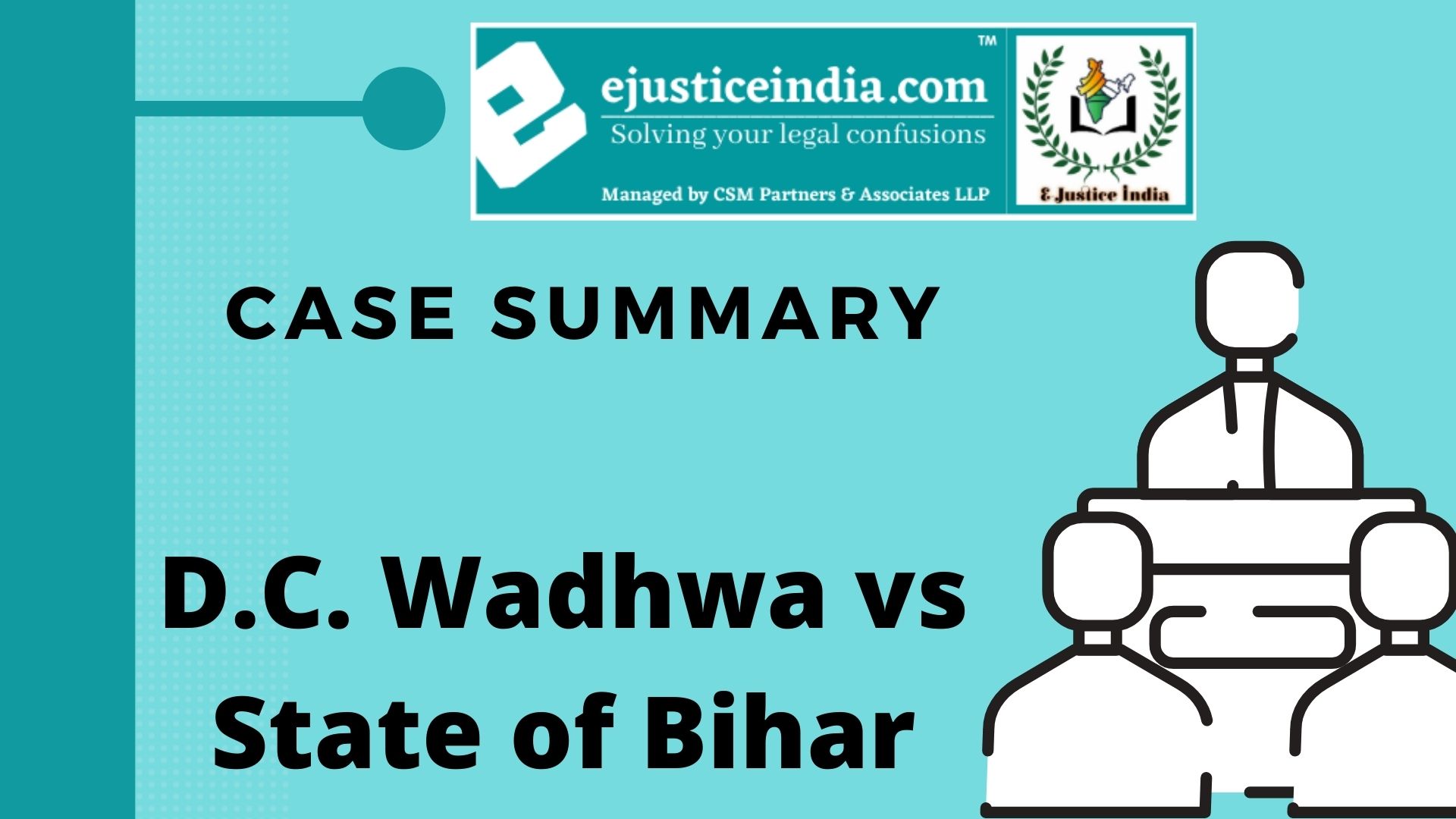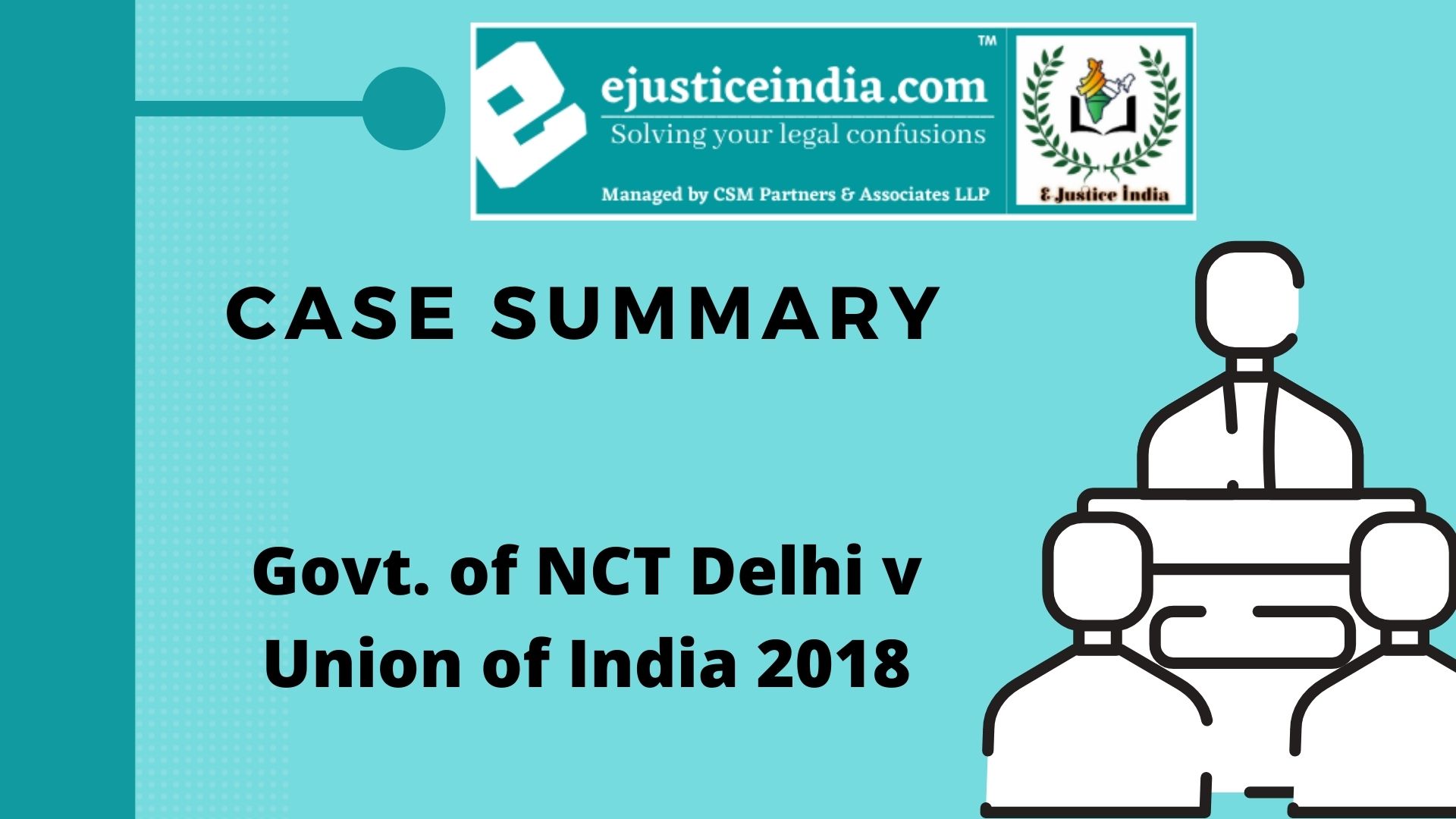The Chairman, Railway Board & Ors. Vs. Mrs. Chandrima Das
Case Name : The Chairman, Railway Board & Ors. Vs. Mrs. Chandrima Das
Author : Aprajita Priyadarshni
EQUIVALENT CITATIONS
AIR 2000 SC 98, (2000) 2 SCC 465
BENCH
Mr. R. P. Sethi, Mr. S. Saghir Anand
INTRODUCTION
This case has been brought up by a petition filed under Article 226 by Mrs. Chandrima Das who was a practising advocate in Calcutta High Court. The petition was filed for compensations to Smt. Hanuffa Khatoon who was a victim of gang rape by many including employees of the Railways at Howrah station.
When there has been violation of Fundamental Rights wherein the petition can be filed in the High Court under Article 226 and in the Supreme Court under Article 32. The fundamental rights are available specifically to the citizens of India except for Articles 14, 20, 21 and 22 which guarantees rights to “persons” which includes non-citizens as well.
The Fundamental Rights guaranteed under Part III are not absolute but are subject to certain reasonable restrictions which also include the consideration for non-citizens to avail these rights with the reasonable restrictions. Also, where public functionaries are involved and the matter relates to the violation of Fundamental Rights or the enforcement of public duties, the remedy would still be available under the Public Law notwithstanding that a suit could be filed for damages under Private Law.
FACTS
Smt. Hanuffa Khatoon, an elected representative of the Union Board from Bangladesh had arrived at Howrah Railway Station on 26th February, 1998 to board a train scheduled at 23:00 hours to visit Ajmer Sharif. As she had a waitlisted ticket, she reached the station at 14:00hours and contacted a Train Ticket examiner for the confirmation of a berth against her ticket. She was asked to wait at the Ladies Waiting Room where at 17:00 hours two persons later identified as Ashoke Singh and Siya Ram Singh approached her, took her ticket and returned it to her after confirming a berth to her in the Jodhpur Express she was waiting to avail.
At about 21:00 hours, Ashoke Singh came to Ladies Waiting Room with another Rafi Ahmed (Parcel Supervisor at Howrah Station) and asked Smt. Khatoon to accompany them to the Yatri Niwas. With an initial doubt but later certification of the credentials of the men by the lady attendants on duty, she accompanied them to Yatri Niwas of the Howarh Railways.
Sitaram Singh, a khalasi of Electric Department joined them on the way and she was taken to Room No. 102 which was booked in the name of Ashoke Singh. In the room, two persons namely Lalan Singh, Parcel Clerk of Howrah Railway Station and Awdesh Singh, Parcel Clearing Agent were waiting. Ashoke Singh forced her into the room while Awdesh Singh bolted the room from outside and stood on guard. The four people inside consumed liquor and even forcibly compelled her to take it after which they brutally assaulted the person of Smt. Hanuffa Khatoon.
She somehow managed to escape and reached the platform of Howrah Station where she met Siya Ram Singh again who was talking to Ashoke Singh. Siya Ram pretended to be her savior and assured to help her. He offered her to accompany him to his residence where he lived with his wife and children as the Jodhpur Express had already departed and the next train was early in the morning. He then took her to the rented flat of Ram Samiram Sharma where Siya Ram raped Hanuffa. On her protests and violent resisting, they both gagged her mouth and nostrils with an intention to kill her. She was later rescued by the Jorabagan Police which was intimidated by the landlord of the building.
Upon these facts, the High Court awarded Rs. 10 lacs as compensation to Smt. Hanuffa Khatoon against which the present appeal has been made to the Hon’ble Supreme Court under its Appellate Jurisdiction.
ISSUES AND FACTS OF LAW
- Whether there was a relief available to the foreigner victim Smt. Hanuffa Khatoon by a petition filed under Article 226?
- Whether the plea of violation of Fundamental Rights was valid for a non-citizen of India?
- Whether can the Railways be vicariously liable for the individual activities of its employees?
JUDGMENT
- A petition under the Article 226 of the Constitution in this case was valid as the High Court has the power of Judicial Review under which every executive or administrative action of the State or other public bodies is open to scrutiny. The High Court has the power to quash the executive action or decision which is contrary to the law or is violative of the Fundamental Rights. Since the Railways is a part o the Public functionaries and there has been utter violation of the fundamental rights of Hanuffa, the petition under Article 226 is maintainable and the relief is to be made available to the victim.
- Even though Smt. Hanuffa Khatoon was a foreigner and a non-citizen, the Fundamental Right of life with dignity guaranteed to a person under Article 21 had been violated. The right under Article 21 was available to both citizens and non-citizens and the offence of rape is violative of such right.
- Not only under the Constitution but also on the provisions and grounds of Human Rights and the Universal Declaration of Human Rights, 1948, the basic fundamental human rights of Smt. Hanuffa Khatoon are protected in the territory of India.
- The Railways can be held vicariously liable for the tort committed by its employees. The employees appointed to Railways for maintaining the Yatri Bhawans or railway platforms are an essential component of the Union of India and the Union Government can be vicariously held liable for the damages to the people who have been wronged by the employees.


